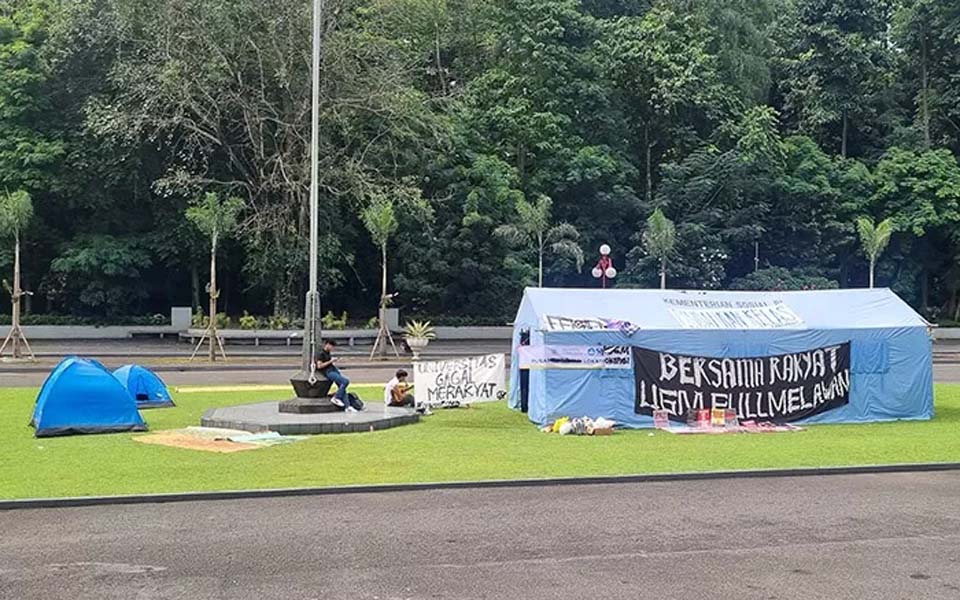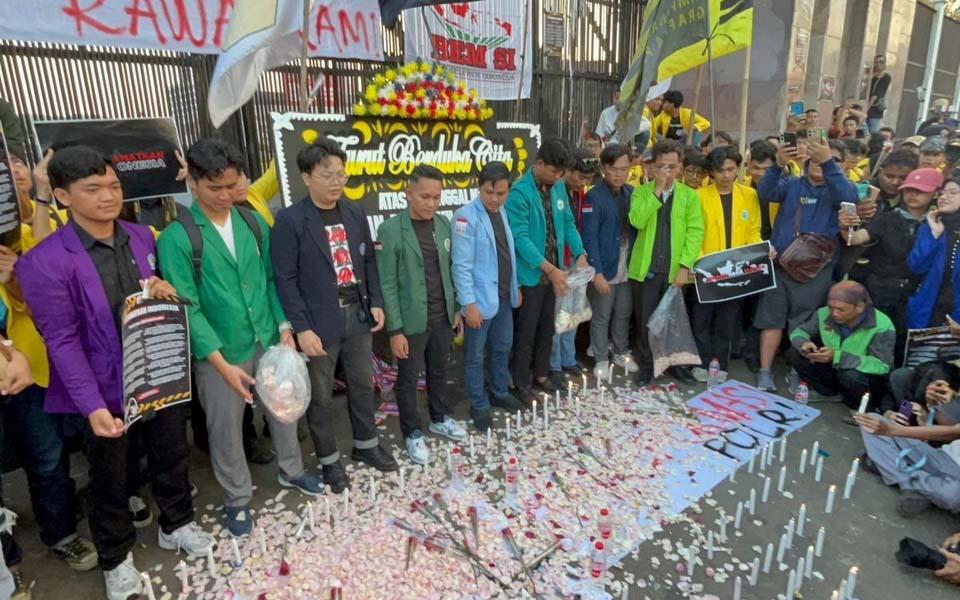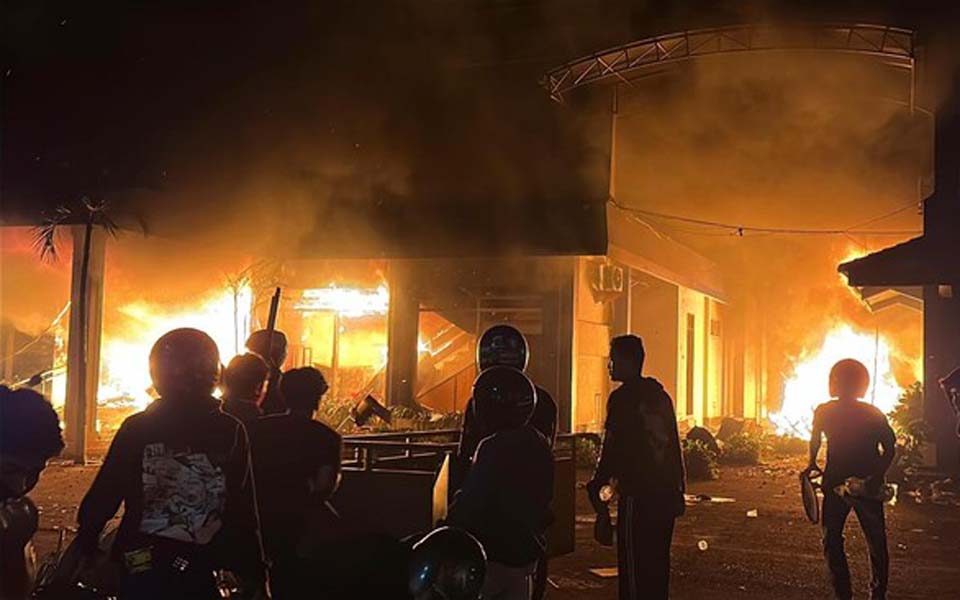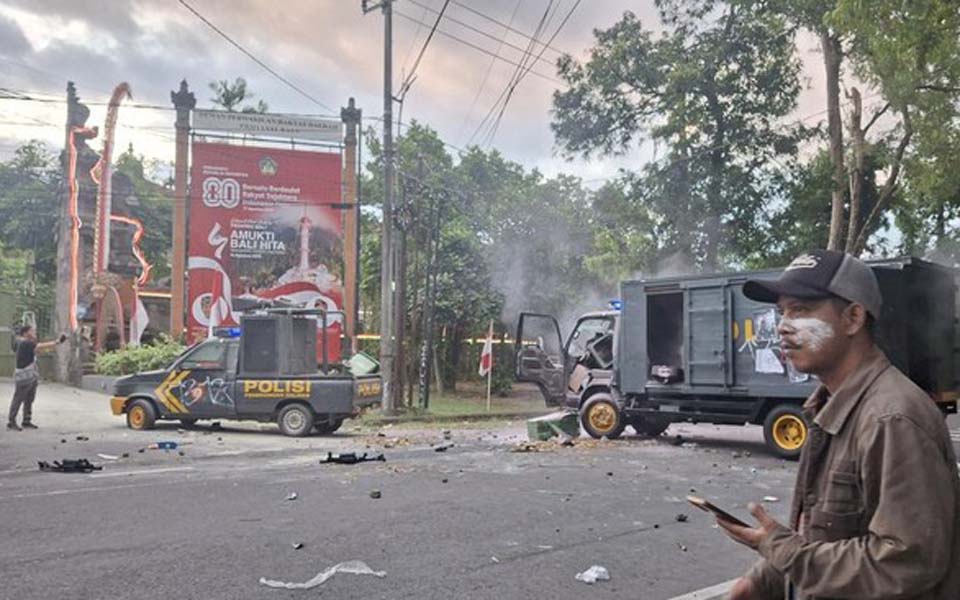Ardhike Indah, Jogja – Heavy rain showered the Gajah Mada University (UGM) campus in the Central Java city of Yogyakarta on the afternoon of Thursday May 15. But the heavy downpour from the sky did not dampen the spirits of a group of students who set up a large blue tent on the grounds of the Pancasila Hall yesterday.
In the tent, they remain, voicing anxieties that have long seethed: about militarism, disappearing public space and the handling of sexual violence cases that are considered disorganised.
"We are staying here to be heard. So, we're taking turns. If there are those who go to lectures in the mornings, then they are here in the afternoon, likewise those to attend lectures in the afternoons, in the morning they're here", said Andri, not his real name, one of the comrades in the UGM Student Alliance when speaking with Tribune Jogja in the tent.
The tent action is not just a normal demonstration. It was born from long discussions and anger that have festered in various faculties and student organisations.
The students highlighted a number of campus policies that are considered not in the interests of students, the academic community and the general public.
One of the issues raised is militarism on campus. The issue become a hot topic when the Udayana University in Bali began cooperating with TNI AD (Army) in the development of an archipelagic outlook.
"In the security structure of the UGM campus, the head of the UGM Security, Occupational Safety, Emergencies and the Environment (K5L) Offices is still an active police officer with the Yogyakarta Regional Police. This position should be filled by a civilian, not an official who is still active in a military institution or the police", Andri said.
"Maybe that also made the K5L's response different from the previous year. In the previous year, the head of the K5L was a retired police officer. Nevertheless he was a civilian, so if there was an action like this, we were not intercepted. But yesterday, we were intercepted, we were blocked, not allowed to setup tents and so on", he explained.
The issues they are articulating do not stop there. Students also highlighted campus efficiency policies that have had a direct impact on their lives. Limitations on campus operating hours, which are now only open until 10 pm, which is a blow for those who need public space to learn, discuss or organise.
"Many students finish lectures at five in the afternoon. But after that, they don't have sufficient space to hold activities. Campus spaces are locked, facility access is limited. Yet, we need public space", he added.
Not only that, the handling of sexual violence cases on campus has also in been the spotlight. The students believe that the UGM Task Force for the Prevention and Handling of Sexual Violence (Satgas PPKS) is not working optimally.
The students are urging a rereading of the paradigm and rules used, as well as the restructuring of the Satgas team so they are more responsive and side with the victims.
The tent action is a form of solidarity, not only for issues at UGM but also in response to the national situation.
They said that what has happened on campus is a reflection of central government policies that tend to accommodate a security approach rather than democratic education that sides with the public.
"We just want this campus to be a safe, just and human place", Andri concluded.
UGM's response
Responding to the tent action, Deputy Chancellor for Student Affairs, Community Services and UGM Alumni Dr. Arie Sujito, S. Sos., M.Sc., said that the student action is an expression of concern and a critical attitude in response to actual problems.
According to Sujito, student involvement in articulating views is part of social responsibility that must be respected.
"The action is part of the concern and critical attitude of students in seeing the reality of the economic, social and macro political situation, including several issues. That is just a common thing in my opinion. And I'm sure the students also have a social responsibility for situations that are seen as needing to be improved", he said.
Furthermore, Sujito stressed the importance of maintaining values of non-violence in the delivery of aspirations so as not to trigger a counterproductive reaction.
He stated that the issues conveyed by students, such as threats to democracy, concerns about remilitarisation, increased unemployment and the impact of the crisis on society, are real problems that need mutual attention.
"UGM has a responsibility to be able to respond proportionally. We believe this crisis does need to be of serious concern. Hopefully this will improve it", he said.
He also underlined the importance of universities and the community actively reading real problems in society through an approach of constructive dialogue and discussion, and that this can produce strategies to overcome national challenges.
In the midst of the growing flow of disinformation in public spaces, Sujito considers that student criticism also plays an important role in maintaining social sanity. He warned that the spread of hoaxes, hate speech and fake news has worsened the atmosphere and influenced public psychology widely.
UGM, continued Sujito, is committed to providing safe space and supporting the freedom of the academic community in expressing opinions, as long as it is carried out peacefully and does not interfere with public order or campus activities.
"The state must be able to improve the speed at which it responds so that there is serious handling, there is certainty. Such uncertainty makes people confused about where to go", he said.
[Slightly abridged translation by James Balowski. The original title of the article was "Di Bawah Tenda dan Hujan Deras, Mahasiswa UGM Kritik Efisiensi dan Penanganan Kekerasan Seksual".]















